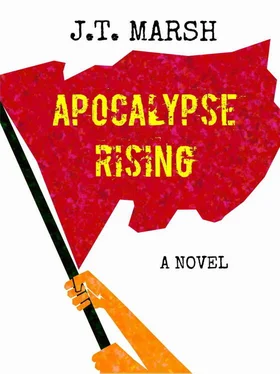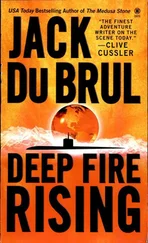When Sydney takes Valeri by the hand and leads him into her bed, she says, “I love you,” before pushing him down and falling on top of him. He reaches for her hair and runs a hand through, then says, “I love you too.” She kisses him, then breaks the kiss to say, “I’ve been in love with you from the moment I first saw you.” He kisses her, then breaks the kiss to say, “I know.” It’s still so early, but in this day and age the twenty- and thirty-somethings like them have learned to move quickly with their relationships, lest events overtake them and tear them apart before they’ve even had the chance to say the words. It’s hard, when men like Valeri have so little, to cling to such things as love for the almost-spiritual sustenance they crave. Amid the cracked, graffiti-covered façade of his apartment building and the sidewalks littered with cigarette butts, used needles, and persons sleeping in whatever little alcove can offer shelter for the night, there’s a spark waiting to be struck, a spark which might grow to a towering inferno that would consume all. But first, we look through this early period and we wonder if freedom will ever come to be.
In the local hospital’s A&E room, Hannah tends to an overdose, struggling to take a blood pressure reading while the overdose writhes in place. He goes into cardiac arrest; they can’t save him. They don’t often save them. A new drug’s ripped through the working class neighbourhoods. This nameless young man isn’t the first Hannah’s seen lose his life to the drug right in front of her. At the end of her shift, she passes by the reception at the hospital’s main entrance, too tired to offer her usual wave to the guard at the door. Arriving home, she finds Valeri and absent, wondering if he’s gone to the hall like he’d said. Exhausted, she soon falls asleep. Sidling along the streets, the working man steps gingerly around every crack in the pavement, every loosened slab of concrete left to slowly disintegrate as the seasons bring new challenges to bear, the rain, the heat, the snow and the sleet. It’s not that this latest collusion hasn’t meant anything; in fact, it’s the current example of the effort hundreds of years in the making, of the wealthy man to take from the working man and, through acts of the imagination turn what he’s taken into so much more than it is. At the union hall, in an industrial district on an island located right where the river flowing through the city separates into a delta on its way out to sea, Valeri flashes his card to get through the door. Once inside, he joins the crowd watching a man standing on the auditorium’s stage giving an impassioned speech.
“…Relentlessly attack our enemy and keep alive the spirit of the revolution fifteen years ago,” the man says, holding a little red book out as he speaks with the passion and intensity of a firebrand preacher. “…And in so keeping remember always that our enemy is still yet determined to win through, to beat us back like cattle, and to shepherd each of us to our slaughter.”
These always strike Valeri as more entertainment than education, given as he is to looking on the street with the kind of forced bemusement and apathy that’s come to be altogether too common among the working men in his generation. At the union hall, things have not always been this way. At the union hall, where once there was little to be done but keep the lights on and hold the occasional, perfunctory vote, now there are men and women, Valeri’s brothers and sisters languishing in unemployment. More than a few have taken to sleeping on cots put out some years ago, with small piles of crates holding everything they own alongside.
Sometimes Valeri counts himself lucky not to be among them, to still have his little box of an apartment and his weekly pittance to subsist on, but as he stands among his brothers and sisters and listens with them to the speaker on stage, he can’t help but feel an arrogance about himself at thinking these poor souls unlucky, for their hopeless lives have not come about by accident but by deliberate campaign to make them so. “Fear not, brothers and sisters,” the man on stage with the little red book says, “for our future is won, but only so long as we diligently and faithfully apply ourselves to the task of working towards it. Read, my brothers and sisters, read and so train yourselves for the imminent arrival of the future.” The troopers never much come around here, but for their watchings of the regular demonstrations more or less leaving the working man to his misery. Men like Valeri know this means their women disappear from the streets at night, some turning up dead months or years later but most never turning up at all, as if the streets themselves swallow each woman whole.
Some argue the working man, people like Valeri’s parents only brought this on themselves, in rising fifteen years ago only prompting the wealthy man and his troopers to seal off the working man and leave him to his own devices. “It’s good to see you,” says a voice, Valeri turning to see an old friend and one-time colleague by the name of Mark Murray. He’d been among the workers at the plant, working right alongside Valeri some days, only to be selected from among their ranks to serve the union higher up. Seeing him again, for Valeri, is bittersweet, for it reminds him how little leverage they have in these trying times even as Murray comes to deliver news usually good. For Murray, you see, is the commensurate politician; he’ll meet with company officials and strike a friendly, conciliatory tone, laughing, telling jokes, shaking hands, only to, when the meetings are over and the sides separate to plot their next moves, denounce fraud, deception, lies. “And yourself,” Valeri says, shaking Murray’s hand. Keeping quiet has always felt a betrayal to Valeri. In so participating in the act, men like Murray draw boundaries, creating a safe space for themselves in which they can act out a theatre, surrendering in the wider struggle. Men like Valeri long for change, and men like Murray seem to have found their niche in demanding change. The vote is held; it’s unanimously in favour of joining the general strike. Later that night, Valeri comes home to an empty and dark apartment. With a spare piece of poster paper and a felt pen he draws up a sign and posts it to the window facing the street. The sign reads: “NO SURRENDER” It’s a small act, but one which’ll come to have great significance in the years ahead.
“…Our final victory is foretold not only by the Heavens but by the natural, inevitable course of our common history, thrumming like the beating of a common heart. But still it must be won!”
The man on stage back at the union hall continues to speak, holding a clenched fist in the air to emphasize his last point. There are talks of taking part in the next general strike; this speaker is urging the whole lot of them on. It’s unsettling to a man like Valeri, someone who would prefer loneliness to a single spot of company, and amid the hushed voices and the muttered agreements he begins to feel his pulse quicken slightly and his breathing shallow a bit, forcing him to turn and make for the edge of the square.
“…And we must never turn away from our destiny!”
A knock on the door.
“You didn’t get caught up in any of that business, did you?” asks Valeri’s landlord, a much older man named Graham with trouble standing up straight and spots all over his skin from aging.
“Not yet,” Valeri replies. Graham had come of age in a more liberal time, when drugs were seen as bold experiments rather than the scourge of the working man’s streets we know them as today.
“You’ve always you’re your rent on time,” Graham says, “I don’t want you getting mixed up in that kind of stuff and making me have to find someone else to pay rent on your suite. God knows it’s hard enough to find a decent tenant these days.”
Читать дальше











